Table of contents
- 1. Friendly Paper Products
- 2. Handmade Soaps and Cosmetics
- 3. Customized Wooden Products
- 4. Spice and Masala Manufacturing
- 5. Leather Goods Manufacturing
- 6. Jute Products Manufacturing
- 7. Bakery Products Manufacturing
- 8. Agarbatti (Incense Sticks) Manufacturing
- 9. Candle Making
- 10. Recycled Plastic Products
- Conclusion
- Frequently Asked Questions (FAQs)
Starting a manufacturing business doesn’t always require a massive investment. With careful planning and strategic execution, you can launch a profitable venture with under 10 lakhs. This article explores 10 promising manufacturing business ideas tailored for budget-conscious entrepreneurs.
1. Friendly Paper Products
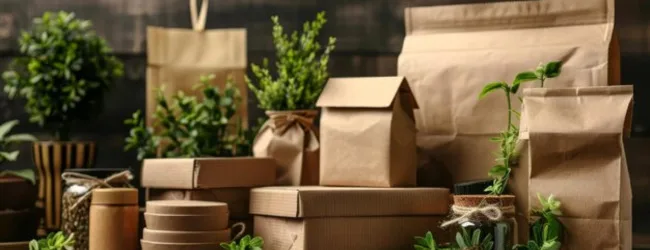
Manufacturing biodegradable paper products like plates, cups, and packaging materials.
a. Why this Idea: Growing demand for sustainable alternatives due to environmental concerns.
b. Licenses Required: Business registration, GST registration, pollution control board clearance (if applicable).
c. Investment Required: 5-8 lakhs (machinery, raw materials, initial operational costs).
d. How to Sell: Direct sales to restaurants, catering services, retail stores, and online platforms.
e. Any other Requirements: Storage space, reliable raw material suppliers.
f. Challenges in the Idea: Competition from established players, ensuring consistent quality.
g. How to overcome the Challenges: Focus on niche markets, offer customized solutions, maintain strict quality control.
Example: A small workshop produces custom-sized biodegradable food containers for local food vendors, emphasizing rapid delivery and eco-friendly branding.
2. Handmade Soaps and Cosmetics

Crafting natural and organic soaps, lotions, and other cosmetic products.
a. Why this Idea: Increasing consumer preference for chemical-free personal care products.
b. Licenses Required: Business registration, GST registration, drug license (if producing medicinal cosmetics).
c. Investment Required: 3-6 lakhs (raw materials, packaging, basic equipment).
d. How to Sell: Online marketplaces, local craft fairs, direct sales, and partnerships with beauty salons.
e. Any other Requirements: Knowledge of cosmetic formulations, hygienic production environment.
f. Challenges in the Idea: Maintaining product consistency, dealing with shelf life issues.
g. How to overcome the Challenges: Use standardized recipes, conduct thorough testing, invest in proper storage.
Example: A home-based business creates personalized gift sets of organic soaps with unique fragrances and natural ingredients, marketed through social media and local artisan markets.
ALSO READ | Start an Online Marketing Home based Business : Step-by-Step Guide for 2025
3. Customized Wooden Products
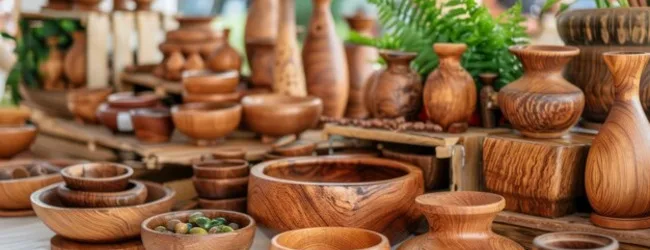
Manufacturing customized wooden furniture, decorative items, and toys.
a. Why this Idea: High demand for personalized and aesthetically appealing wooden products.
b. Licenses Required: Business registration, GST registration.
c. Investment Required: 5-9 lakhs (woodworking machinery, raw materials, finishing tools).
d. How to Sell: Online platforms, interior design firms, direct orders, and craft fairs.
e. Any other Requirements: Skilled labor, design software knowledge.
f. Challenges in the Idea: Sourcing quality wood, managing production timelines.
g. How to overcome the Challenges: Establish relationships with reliable suppliers, use project management tools.
Example: A small workshop specializes in crafting custom wooden signage for local businesses, offering unique designs and quick turnaround times.
💡 Pro Tip: If you want to start a Manufacturing Business but have too many doubts, connect with a Manufacturing Business expert from Boss Wallah for guidance – https://bw1.in/1116
4. Spice and Masala Manufacturing

Processing and packaging spices and masala blends.
a. Why this Idea: Consistent demand for spices in the food industry and households.
b. Licenses Required: FSSAI license, business registration, GST registration.
c. Investment Required: 4-7 lakhs (grinding machines, packaging equipment, raw materials).
d. How to Sell: Local grocery stores, supermarkets, online marketplaces, and direct sales.
e. Any other Requirements: Hygienic processing environment, quality control measures.
f. Challenges in the Idea: Maintaining consistent flavor profiles, competition from established brands.
g. How to overcome the Challenges: Use high-quality raw materials, implement strict quality control, focus on unique blends.
Example: A home-based unit creates regional spice blends with authentic recipes, packaged in eco-friendly materials and sold through local farmers’ markets and online platforms.
5. Leather Goods Manufacturing
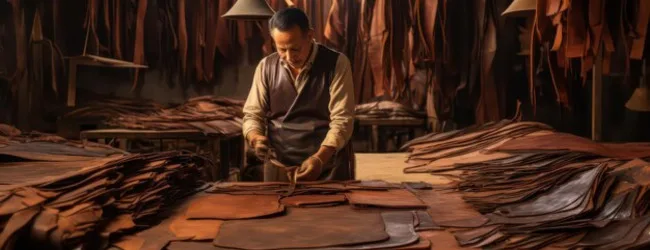
Producing leather wallets, belts, bags, and accessories.
a. Why this Idea: High demand for durable and stylish leather products.
b. Licenses Required: Business registration, GST registration, export license (if exporting).
c. Investment Required: 6-10 lakhs (leather cutting machines, sewing machines, raw materials).
d. How to Sell: Online platforms, retail stores, direct sales, and export markets.
e. Any other Requirements: Skilled labor, knowledge of leather crafting techniques.
f. Challenges in the Idea: Sourcing high-quality leather, managing production costs.
g. How to overcome the Challenges: Establish relationships with tanneries, optimize production processes.
Example: A small workshop crafts minimalist leather wallets with personalized engravings, sold through online marketplaces and partnerships with boutique stores.
6. Jute Products Manufacturing
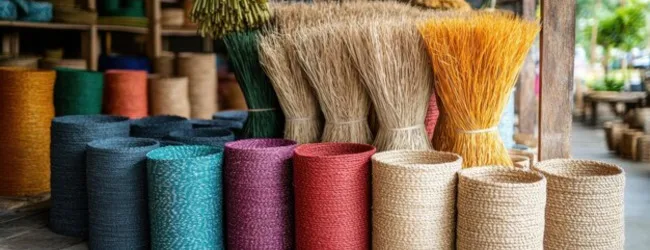
Manufacturing jute bags, mats, and decorative items.
a. Why this Idea: Growing demand for eco-friendly and biodegradable products.
b. Licenses Required: Business registration, GST registration.
c. Investment Required: 4-7 lakhs (jute processing machines, sewing machines, raw materials).
d. How to Sell: Retail stores, online platforms, export markets, and direct sales.
e. Any other Requirements: Storage space, skilled labor.
f. Challenges in the Idea: Managing raw material costs, ensuring consistent quality.
g. How to overcome the Challenges: Source jute from local suppliers, implement quality control measures.
Example: A small unit produces stylish and durable jute tote bags with unique designs, marketed to environmentally conscious consumers and retail stores.
7. Bakery Products Manufacturing
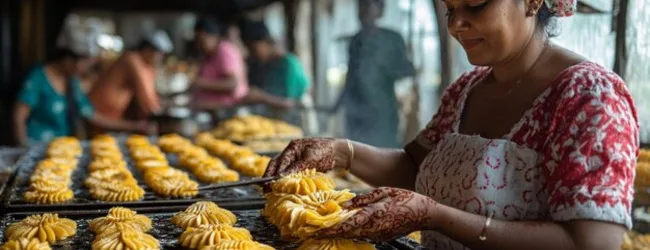
Baking and packaging cookies, cakes, and other bakery items.
a. Why this Idea: Consistent demand for baked goods in the food industry.
b. Licenses Required: FSSAI license, business registration, GST registration.
c. Investment Required: 5-8 lakhs (ovens, mixers, packaging equipment, raw materials).
d. How to Sell: Local bakeries, cafes, online platforms, and direct sales.
e. Any other Requirements: Hygienic production environment, baking skills.
f. Challenges in the Idea: Maintaining freshness, managing ingredient costs.
g. How to overcome the Challenges: Use quality ingredients, implement efficient packaging, focus on specialty items.
Example: A home-based bakery produces artisanal cookies with unique flavors and natural ingredients, marketed through local cafes and online delivery platforms.
8. Agarbatti (Incense Sticks) Manufacturing

Producing and packaging incense sticks.
a. Why this Idea: Consistent demand for incense sticks in religious and household use.
b. Licenses Required: Business registration, GST registration.
c. Investment Required: 3-5 lakhs (mixing machines, rolling machines, raw materials).
d. How to Sell: Retail stores, religious shops, online platforms, and direct sales.
e. Any other Requirements: Storage space, knowledge of fragrance blending.
f. Challenges in the Idea: Managing raw material costs, competition from established brands.
g. How to overcome the Challenges: Source raw materials directly, focus on unique fragrances, implement efficient production.
Example: A small unit produces hand-rolled incense sticks with natural fragrances, packaged in eco-friendly materials and sold through local temples and online platforms.
ALSO READ | Start Home-Based Online Tutoring Business: Guaranteed Success in 10 Easy Steps
9. Candle Making
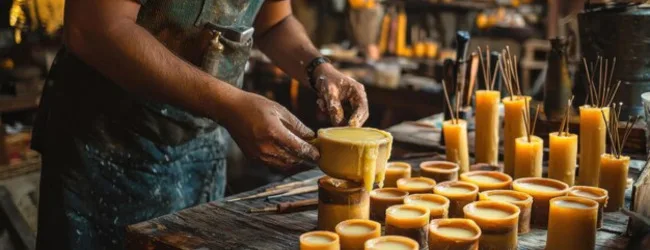
Producing handmade scented candles.
a. Why this Idea: Increasing demand for home decor and aromatherapy products.
b. Licenses Required: Business registration, GST registration.
c. Investment Required: 2-4 lakhs (wax melting pots, molds, fragrances, packaging materials).
d. How to Sell: Online platforms, craft fairs, gift shops, and direct sales.
e. Any other Requirements: Knowledge of candle making techniques, fragrance blending.
f. Challenges in the Idea: Achieving consistent fragrance and burn quality, managing raw material costs.
g. How to overcome the Challenges: Use high-quality waxes and fragrances, implement strict quality control, optimize production processes.
Example: A home-based business creates custom-designed scented candles with natural waxes and essential oils, marketed as luxury home decor and relaxation products.
10. Recycled Plastic Products

Manufacturing products from recycled plastic, like planters, furniture, or construction materials.
a. Why this Idea: Growing demand for sustainable and eco-friendly products, addressing plastic waste issues.
b. Licenses Required: Business registration, GST registration, pollution control board clearance.
c. Investment Required: 7-10 lakhs (plastic recycling machines, molding equipment, raw materials).
d. How to Sell: Construction companies, landscaping businesses, retail stores, and online platforms.
e. Any other Requirements: Sourcing recycled plastic, knowledge of plastic recycling processes.
f. Challenges in the Idea: Ensuring consistent quality of recycled plastic, managing recycling processes.
g. How to overcome the Challenges: Establish reliable sources for recycled plastic, implement thorough quality checks, invest in efficient recycling technology.
Example: A small manufacturing unit produces durable and weather-resistant garden planters from recycled plastic, marketed to environmentally conscious consumers and landscaping businesses.
Need Expert Guidance?
Starting a business can be challenging, but you don’t have to do it alone! At Boss Wallah, our 2,000+ business experts are ready to provide valuable insights and guidance. Whether you need help with marketing, finance, sourcing, or any other area of any business, our business experts are here to help you succeed- https://bw1.in/1116
Confused about Which Business to Start?
Want to start your own business but unsure which one to choose? Explore Boss Wallah, where you’ll find 500+ courses by successful business owners, featuring practical, step-by-step guides on starting and growing various businesses. Find your perfect business idea today – https://bw1.in/1111
Conclusion
Starting a manufacturing business under 10 lakhs is achievable with the right idea and execution. These 10 ideas offer diverse opportunities to tap into growing markets while managing your investment. Remember to conduct thorough market research, create a detailed business plan, and focus on delivering high-quality products. With dedication and strategic planning, you can build a successful and profitable manufacturing venture.
Frequently Asked Questions (FAQs)
- What are the most important licenses required for a manufacturing business in India?
- Business registration, GST registration, and specific licenses like FSSAI (for food products) or drug licenses (for cosmetics) are crucial. Pollution control board clearance may also be needed depending on the type of manufacturing.
- How can I find reliable suppliers for raw materials?
- Online directories, industry trade shows, local markets, and direct contact with manufacturers are effective methods. Networking with other businesses in the industry can also provide valuable leads.
- What are the best online platforms to sell manufactured products?
- Amazon, Flipkart, Etsy, and specialized e-commerce platforms like IndiaMART are popular choices. Building your own e-commerce website can also provide greater control and branding opportunities.
- How can I market my manufacturing business on a limited budget?
- Social media marketing, content marketing, local partnerships, and participation in craft fairs or trade shows are cost-effective strategies. Focus on building an online presence and leveraging word-of-mouth marketing.
- What are the key factors to consider when choosing a manufacturing location?
- Proximity to raw materials, transportation infrastructure, availability of skilled labor, and local regulations are essential factors. Consider the cost of rent or purchase, and the availability of utilities.
- How can I ensure the quality of my manufactured products?
- Implement strict quality control measures, use high-quality raw materials, conduct regular testing, and obtain relevant certifications. Customer feedback is also invaluable for quality improvement.
- What are the common challenges faced by small manufacturing businesses?
- Competition, managing cash flow, sourcing reliable suppliers, maintaining product consistency, and navigating regulatory requirements are common challenges.
- How can I manage the initial investment of under 10 lakhs efficiently?
- Prioritize essential equipment, lease or rent equipment when possible, negotiate favorable terms with suppliers, and start with a lean operational model. Carefully track expenses and reinvest profits strategically.


